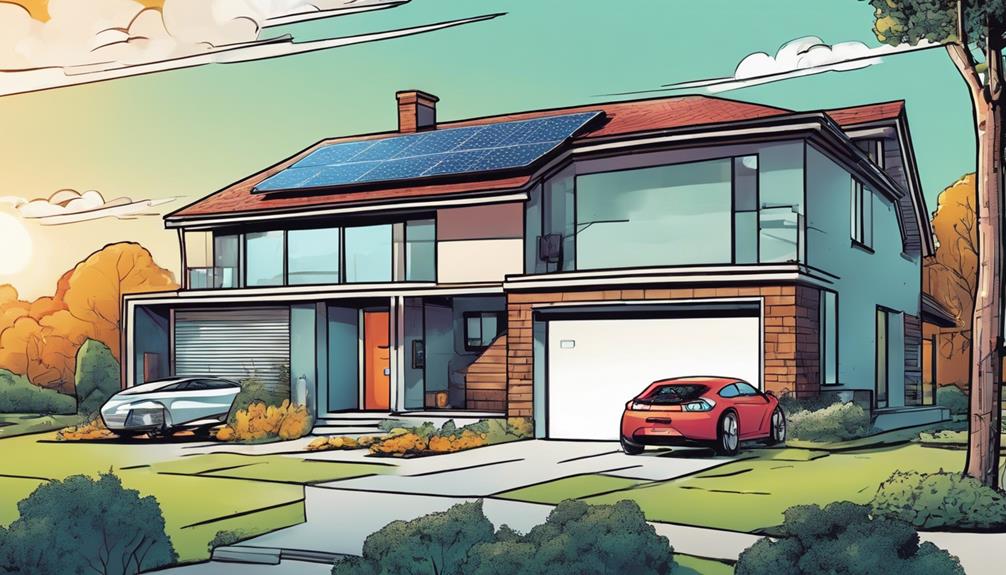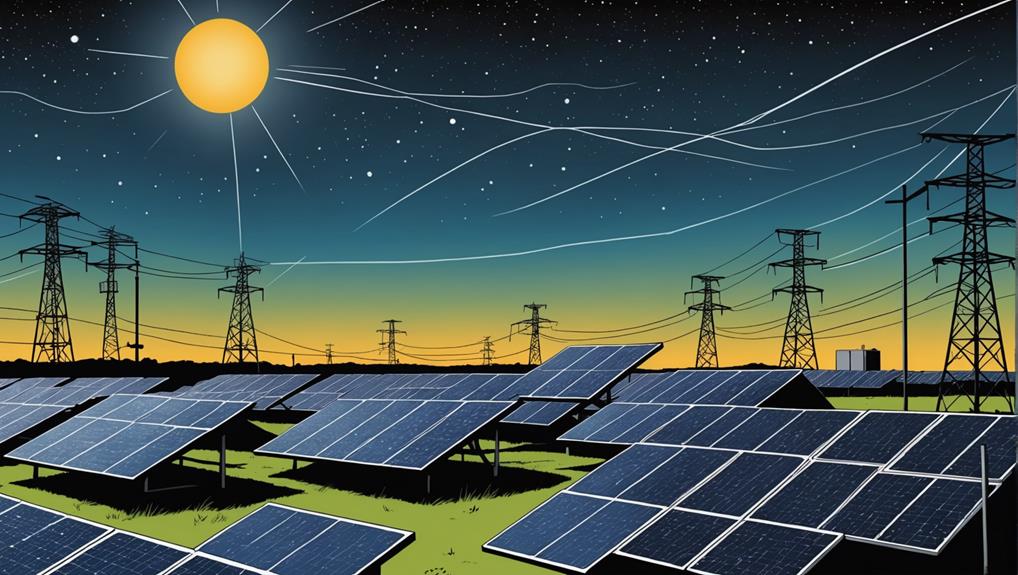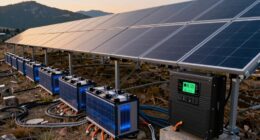To go off the grid using solar energy, you generally need around 7 kW of solar power for self-sufficiency. Factors like energy consumption, roof space, and sunlight exposure affect the required number of solar panels. Make sure to calculate your daily energy needs to determine the ideal system size. Choosing high-quality solar panels is essential for efficiency and reliability. For more details on solar panel calculations, selection tips, backup power solutions, cost analysis, and environmental benefits, keep exploring the information provided to help you make informed decisions about going off the grid with solar energy.
Key Takeaways
- Calculate daily energy consumption to determine required solar panel wattage.
- Consider roof space availability and sunlight exposure for optimal solar energy production.
- Aim for around 7 kW of solar power for a typical off-grid home.
- Choose high-quality solar panels based on efficiency and wattage.
- Ensure backup power solutions like batteries or generators for continuous electricity supply.
Off-Grid Solar Basics
When considering off-grid solar basics, understanding the concept of energy independence is vital. Off-grid solar systems aim to provide full energy independence by relying solely on solar power systems.
To achieve this, an off-grid home typically needs around 7 kW of solar power to cover daily energy consumption. The number of solar panels needed for adequate solar energy production depends on factors such as solar panel wattage, available roof space, energy consumption patterns, and sunlight exposure.
For complete energy independence, it's important to make sure that the off-grid solar system generates enough solar energy to meet the household's electricity needs throughout the day. By carefully calculating daily energy consumption and evaluating the sunlight exposure at the installation site, you can determine the best number of solar panels required to achieve self-sufficiency.
Embracing off-grid solar basics means embracing the potential for a sustainable and independent energy future.
Solar Panel Requirements Calculation
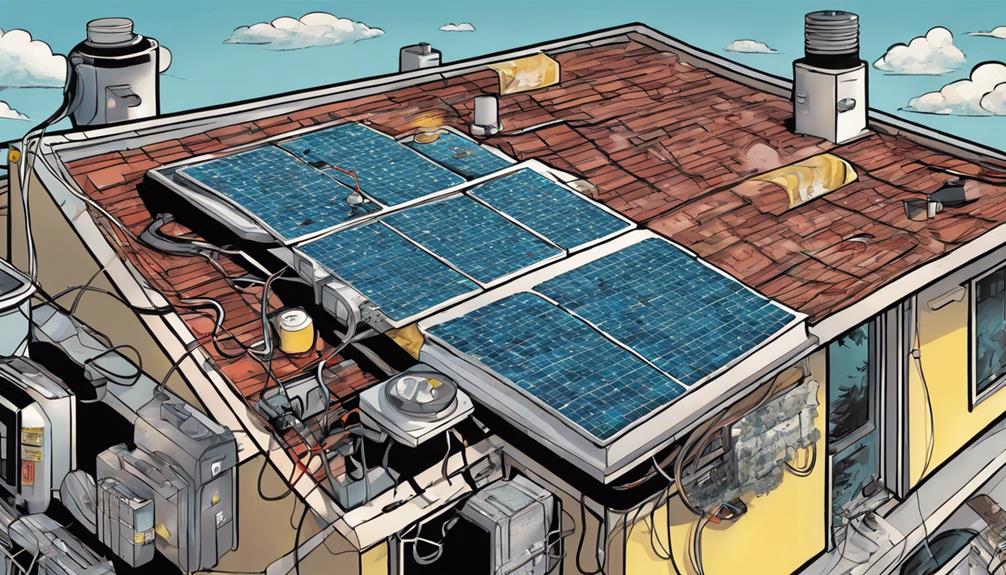
To accurately determine your off-grid solar panel requirements, calculate the number of solar panels needed based on your daily energy consumption and the peak sunlight hours in your area. Consider factors such as roof space availability, panel wattage, and sunlight exposure to guarantee your system meets your needs.
An average off-grid home typically requires around 7 kW of power for self-sustainable energy production. The National Renewable Energy Laboratory website provides peak sunlight hours data to assist in sizing your solar system appropriately.
When calculating the number of solar panels needed, take into account roof shading and panel performance. These factors can impact the efficiency of your system and the overall energy output. By carefully considering these elements, you can optimize the design of your off-grid solar setup and guarantee that it meets your energy requirements effectively.
Make use of available resources and data to make informed decisions about the size and specifications of your solar panel array.
Solar Panel Selection Guide
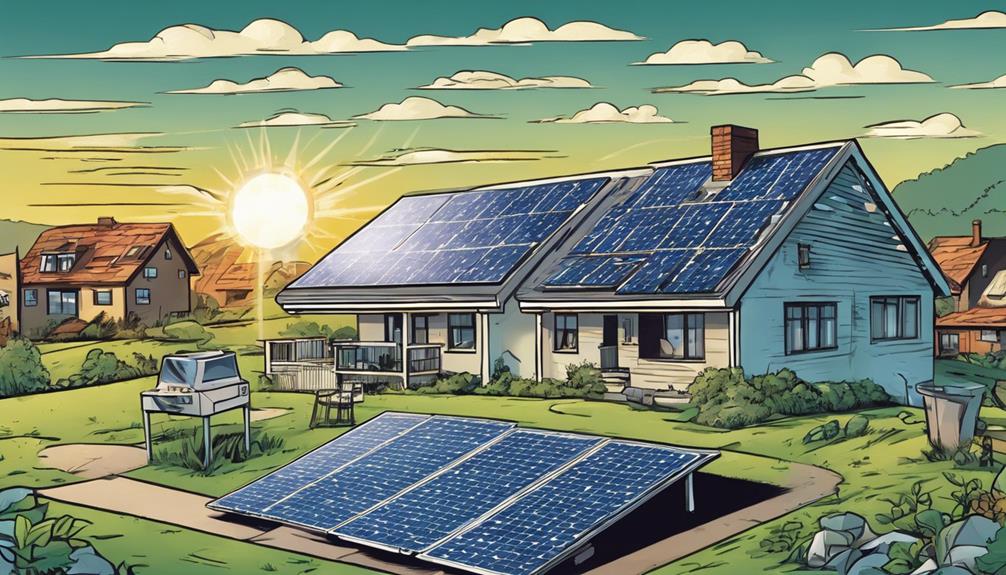
Choosing the appropriate solar panels for off-grid living involves taking into account factors like roof space availability, energy consumption, and sunlight exposure to guarantee peak system performance. When selecting solar panels, consider the panel wattage to meet your energy needs efficiently.
High-quality panels from reliable brands ensure durability and peak energy conversion. For off-grid setups, aim for 10-15 panels to power a typical home, depending on sunlight availability and energy requirements.
Opting for solar panel kits from trusted brands like Renogy, WindyNation, or ECO-WORTHY can simplify the installation process and ensure compatibility among components. Careful solar panel selection is essential for determining the energy production capacity and overall success of your off-grid system.
Prioritize quality, efficiency, and compatibility to maximize the benefits of using solar energy for off-grid living.
Backup Power Solutions
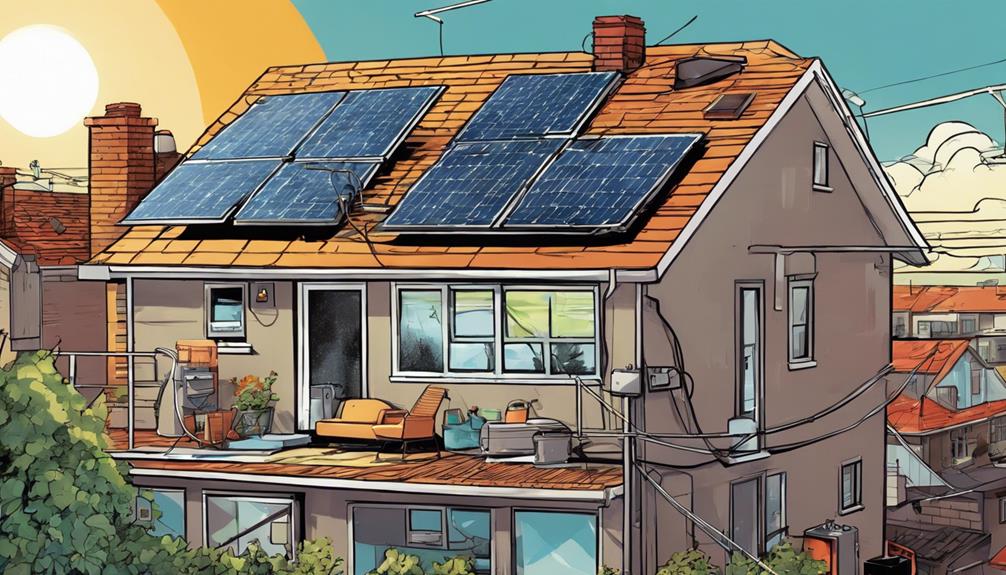
When considering backup power solutions for your off-grid solar system, it's essential to understand their importance for continuous electricity supply.
You'll need to decide between solar batteries, which store excess energy for use during low sunlight periods, and generators, which can provide backup power during high energy demands.
Make sure to carefully consider factors like energy usage and solar panel output to choose the right backup power solution for your off-grid setup.
Backup Power Importance
Backup power solutions such as solar batteries and generators are essential for ensuring a continuous electricity supply in off-grid solar systems. In off-grid living, where reliance on solar panels is the main source of energy, backup power plays a pivotal role in maintaining a reliable electricity supply.
The amount of backup power required is dependent on the energy consumption of the home and the solar panel output. SouthFace Solar & Electric can assist in selecting the appropriate backup power solution tailored to your needs, ensuring uninterrupted energy independence.
Having reliable backup power options is crucial for off-grid living, especially during nighttime and overcast days when solar energy production is limited. By investing in backup power solutions, you aren't only ensuring a continuous supply of electricity but also enhancing the overall reliability of your off-grid solar system.
Choosing Between Batteries
Solar batteries, essential for off-grid systems, provide a reliable storage solution for excess energy generated by solar panels.
When choosing between batteries for your solar installation, consider the following:
- Energy Usage: Assess your energy needs to determine the capacity required for backup power solutions.
- Solar Panel Output: Understand how much energy your solar panels can generate to size your battery bank appropriately.
- Desired Level of Energy Independence: Define how self-sufficient you want to be and choose a battery system that aligns with your goals.
Ensuring a continuous electricity supply in off-grid homes hinges on selecting the right solar batteries. These backup power solutions offer a dependable source of energy when sunlight is scarce.
Generator Considerations
Considering your energy needs and the reliability of your off-grid system, generators serve as important backup power solutions to guarantee uninterrupted electricity supply. Generators are crucial for off-grid homes, providing backup power during periods of low sunlight or at night. The amount of backup power required depends on the energy usage of your off-grid system and the solar panels' output. SouthFace Solar & Electric can assist in selecting the right generator to ensure a reliable backup power solution for your off-grid solar system, enhancing its sustainability and reliability.
| Backup Power Solutions | Benefits |
|---|---|
| Generators | Provide continuous electricity supply |
| Energy Usage | Determines amount of backup power needed |
| Off-grid Homes | Benefit from reliable backup power |
| Off-grid Solar Systems | Enhance sustainability and reliability |
Off-Grid Solar Benefits Evaluation
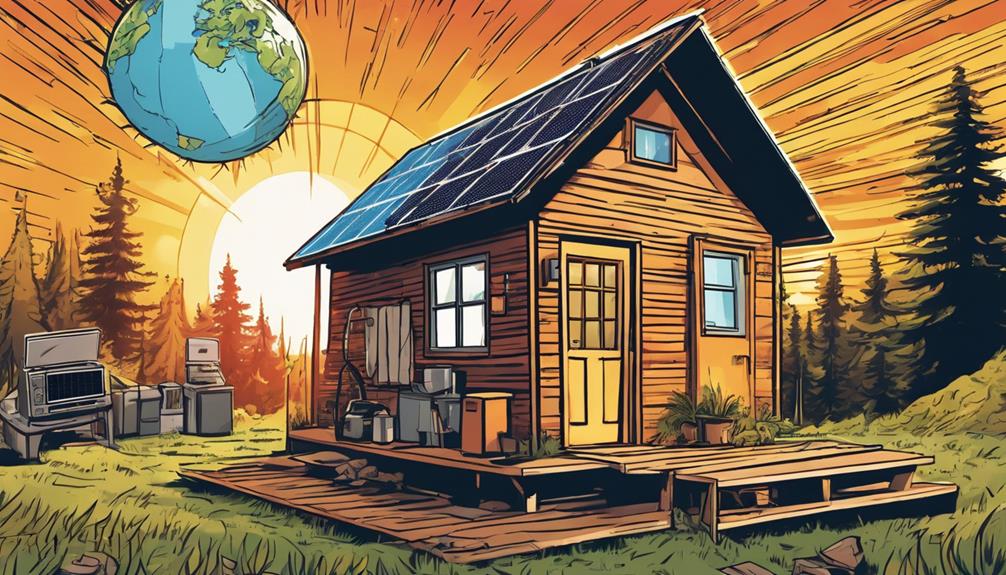
You should consider the cost-efficiency and environmental impact of off-grid solar systems. Examining the financial savings and eco-friendly benefits will help you make an informed decision about going off the grid with solar energy.
Reviewing these points is essential for understanding the long-term advantages of off-grid solar power.
Cost-Efficiency Analysis
When evaluating the cost-efficiency of shifting to off-grid solar energy, it's important to take into account various factors that impact long-term savings and return on investment. Factors such as location, energy consumption, available sunlight, and system size play pivotal roles in determining the cost-effectiveness of an off-grid solar system.
To grasp the financial benefits of going off-grid with solar energy, consider the following:
- Installation costs: Initial expenses for setting up the off-grid solar system.
- Long-term savings: Potential elimination of monthly utility bills leading to significant savings over time.
- Return on investment (ROI): Calculating the financial return considering installation costs, ongoing energy savings, and possible tax incentives.
Understanding the cost-efficiency of an off-grid solar system requires a thorough analysis of upfront expenditures versus future economic gains. By carefully evaluating these factors, you can make an informed decision about the financial viability of shifting to off-grid solar energy.
Environmental Impact Assessment
Off-grid solar systems offer substantial environmental benefits by reducing carbon footprint and promoting sustainability through the use of renewable energy sources. When considering the environmental impact assessment of shifting to off-grid solar, it becomes evident that going off-grid with solar power is a vital step towards combatting climate change. By reducing greenhouse gas emissions and decreasing pollution from traditional energy sources, off-grid solar systems contribute to environmental sustainability and support a healthier planet for future generations.
To further highlight the benefits of off-grid solar systems, let's look at the environmental impact assessment in the table below:
| Off-Grid Solar Benefits | Evaluation |
|---|---|
| Reduces carbon footprint | ✔️ |
| Decreases greenhouse gas emissions | ✔️ |
| Promotes environmental sustainability | ✔️ |
| Supports combatting climate change | ✔️ |
Cost Analysis for Off-Grid Systems
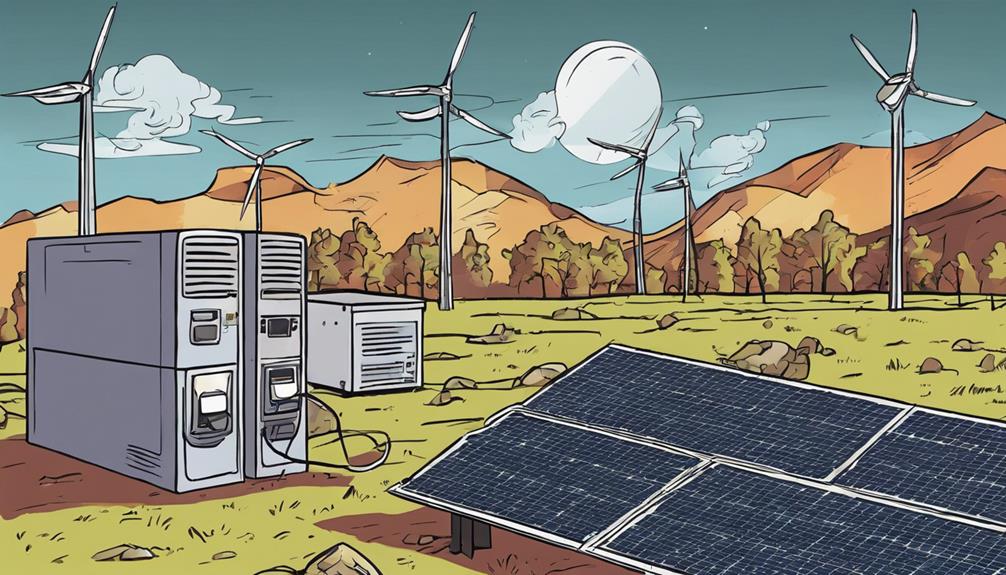
The cost analysis for off-grid solar systems varies significantly based on factors such as system size, battery capacity, and geographic location. When contemplating going off-grid, it's crucial to take into account these key aspects:
- Off-grid solar kits: Offer varying price points and quality levels from reputable brands like Renogy, WindyNation, and ECO-WORTHY.
- Professional installation: Can exceed $150,000, so it's important to consider budget constraints.
- DIY installation: Lower quality kits are available, but may lack the reliability and efficiency of professional systems.
Factors like system size, battery storage capacity, and equipment quality play a significant role in determining the overall cost of an off-grid solar setup. It's vital to weigh the initial investment against long-term savings and energy independence when deciding between DIY and professional installation, ensuring that the chosen system meets both your budget and energy needs effectively.
Solar Panel Recommendations
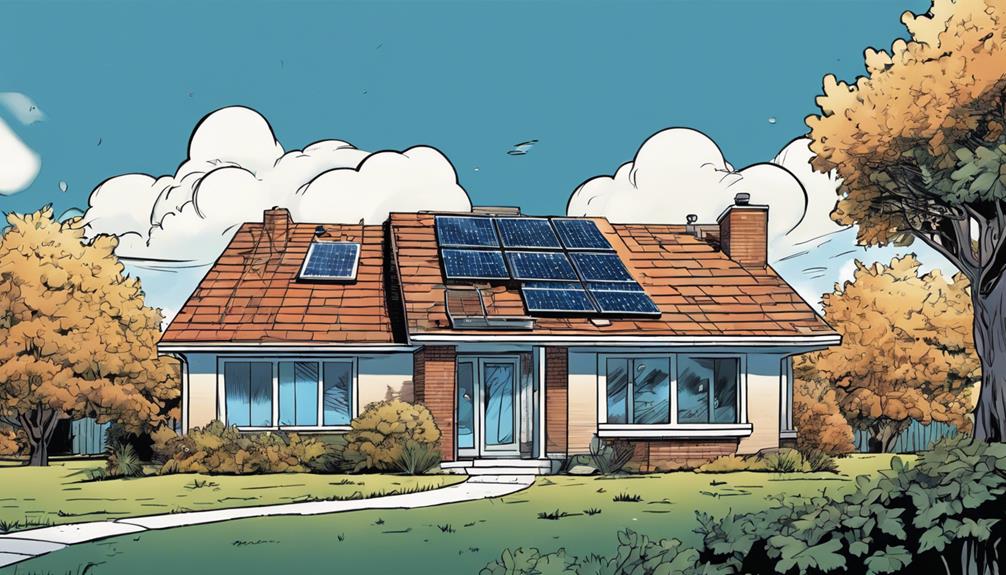
Consider utilizing high-quality solar panels like the 400W Tier-1 Monocrystalline Solar Panel for best off-grid living. These panels are durable, offer long warranties, and are highly efficient, ensuring maximum energy generation for your off-grid system.
When looking for solar panel purchases, platforms like ShopSolar.com provide transparent and affordable solar solutions, making them a reliable choice. Selecting the right solar panel is essential for best energy production and reliability in your off-grid living setup.
Expert advice and online calculators can guide you in choosing the best solar panel kit tailored to your off-grid system requirements. By investing in top-tier Monocrystalline Solar Panels, you can guarantee that your off-grid system operates efficiently and effectively, providing you with the energy independence you seek for your off-grid lifestyle.
Solar Power Efficiency and Output
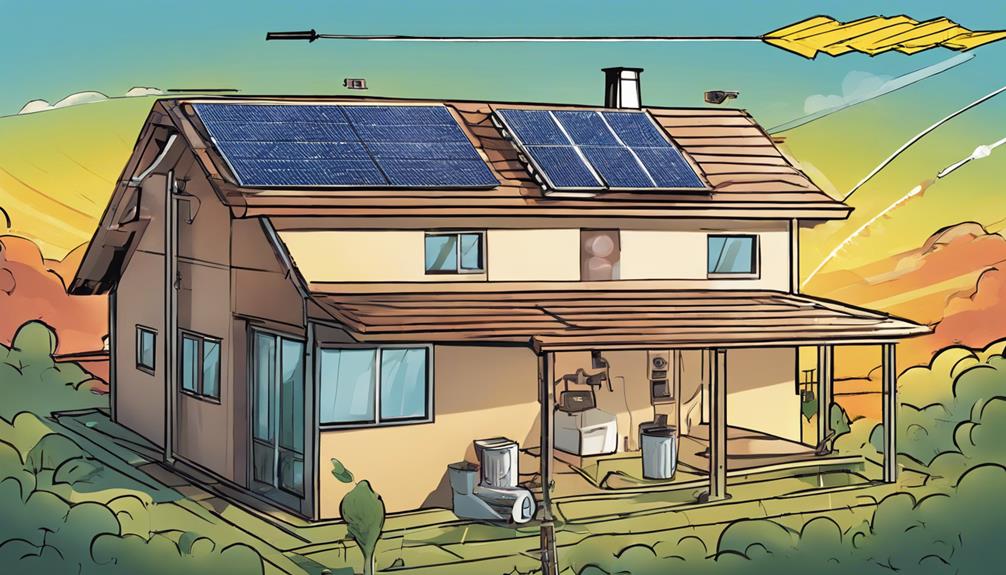
For best energy production and efficiency in your off-grid system, understanding solar power efficiency and output is essential. Here are some key points to keep in mind:
- Solar panels range from 250 to 400 watts for residential use, impacting energy generation.
- Panel efficiency plays a significant role in maximizing electricity production from sunlight.
- Determining the number of solar panels needed for your off-grid home depends on factors like home size, material, and daily consumption.
When aiming for optimal energy production, it's vital to acknowledge that higher power ratings don't always equate to better efficiency. Taking into account both panel efficiency and power output is crucial to calculate the solar energy required to successfully go off the grid.
Frequently Asked Questions
Is It Worth It to Go Off-Grid With Solar?
Going off-grid with solar is worth it. You gain energy independence, reduce utility bills, and contribute to environmental sustainability. Calculate the right amount of solar energy based on your consumption, efficiency, and storage needs.
How Much Solar to Be Self-Sufficient?
You need a solar setup as powerful as a superhero to be self-sufficient off the grid. Calculate your electricity usage, consider sunlight hours, and panel efficiency. It's all about finding that perfect balance for sustainability.
How Much Money Can You Make Selling Solar Energy Back to the Grid?
You can make money selling solar energy back to the grid based on your local utility's policies and the excess energy your panels produce. Higher rates in some states offer added incentives for solar owners, contributing to renewable energy efforts.
How Many Panels Do I Need for a Off-Grid Solar System?
To figure out how many panels you need for an off-grid solar system, consider factors like energy consumption, sunlight exposure, and panel efficiency. On average, homes aim for 10-15 panels for energy independence.
What is the Relationship Between Selling Excess Solar Energy and Going Off the Grid?
Selling excess solar energy can help homeowners earn extra income while also going off the grid. By generating more solar power than needed, individuals can sell the surplus back to the grid, offsetting their energy costs. This allows them to become more self-sufficient and sustainable while earning from excess solar energy.
Conclusion
As you navigate the vast sea of solar energy options to go off the grid, remember that each solar panel is a beacon of hope, guiding you towards a sustainable future.
Just like a compass points north, your dedication to renewable energy will lead you towards a brighter tomorrow.
So set sail with confidence, knowing that your decision to harness the power of the sun will illuminate a path towards a greener, more self-sufficient lifestyle.
